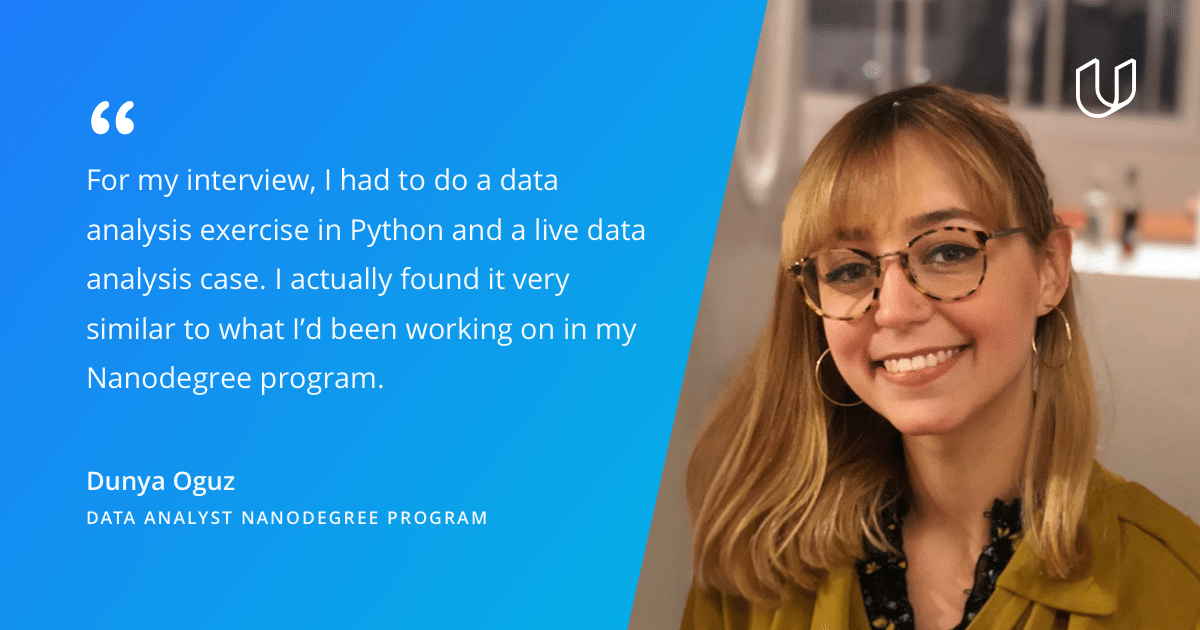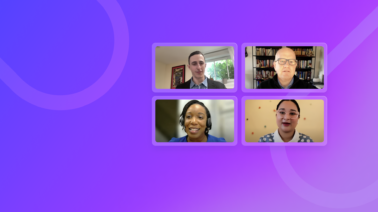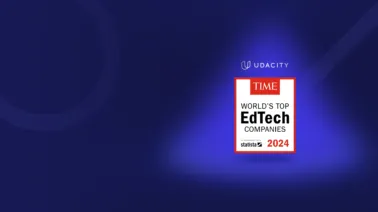Find the right nanodegree program for you.
Start Learning
The inspiration to learn new tech skills can come from many places. For Dunya Oguz, it came when she started her first job after college. Dunya moved from Turkey to study economics at McGill University in Canada. When she graduated, she landed a marketing role at a fast-paced startup and quickly got inspired by the tech savviness of her colleagues. Soon, Dunya was exploring how she could build her own skill set, particularly in data analytics and SQL. That’s when she found Udacity and enrolled in the Data Analyst Nanodegree program. Within a matter of months, she realized she’d found a subject she felt really passionate about, and started applying to roles in data analysis. She started getting responses—even before she’d graduated the program!

Now, Dunya works as a data analyst for a Canadian startup that builds mobile free-to-play games. She’s super excited about her work, and sees opportunities to grow her career in a thousand different directions. This is Dunya’s story.
When did you start considering an online learning experience as the best option for you to build your data skills?
One of the reasons I actually started looking at online study options was because I really wanted to take a Master’s but—because I’m on a work permit in Canada right now—I knew I’d have to wait until I got my residency status so I could study. I was disappointed about that, but I still felt I had to learn and develop myself, so I started looking at online courses. The Udacity program was the first one that came up, and I liked it immediately. I liked that there were pre-recorded videos, and that it was structured with project deadlines, but you also had the flexibility about where and when you studied. So I decided to enroll.
As you studied, you realized that data wasn’t just something that would be useful in your current role, but something much bigger. That’s right, isn’t it?
My role’s focus on data is what spurred my initial interest in the Nanodegree program. I just thought I could do my marketing job much better if I could use SQL and do basic analysis. But once I’d enrolled and got started, I realized that I REALLY enjoyed data analysis. I started thinking of it more and more as a real career option for me. There just seemed to be far more appealing future opportunities in data than I could see in marketing. And I saw that it was something I had a passion for—I wanted to take time outside of work to learn it myself and build my skills.
What did you think of the experience of learning with Udacity?
I think the program was great and really fundamental. My boyfriend is doing a Master’s right now, in Business Analytics, and the things he was learning in his first months were topics I was able to help him with—because I’d already covered the basics in my program months before. It was great to be able to do that and showed me I was learning the right topics.
So when did you start thinking about taking what you had learned and turning it into a new career in data?
I think around eight months into my marketing job, I started feeling pretty disinterested with what I was working on. That’s when I started actively looking at other things. I think I was applying for different opportunities for around two months while I was still working. I felt like I just had my Nanodegree program on my resume to show experience with data analysis. But actually, during that time, I was also using my new data skills in my role, so I was able to present that experience too.
Tell us how your search for a new role went.
I wasn’t getting responses from every single company out there, but I definitely was getting responses, which was very encouraging. I had five or six interviews for different companies. In the end, I had offers on the table from two different places. One of them was my now-employer, a games company called Mino Games.
Did you have to do a practical demonstration of your skills as part of the recruitment process?
I had to do a data analysis exercise in Python and a live data analysis case. I actually found it very similar to what I’d been working on in my program. The challenge they gave me felt like the format and the style of questions and problems I was used to from the projects I did in my Nanodegree program!
And they offered you the job?
Yes! It’s another startup for me, which I like. I really like the work and the company—it’s a demanding environment, but I like that because I’m a hard worker. That kind of culture pushes you to learn a lot, and I think you need a little adrenaline at work to keep you super focused and interested.
Are you using the skills you learned in your program in your new role?
I’m using Python a lot right now, and that’s something I learned solely from Udacity. And SQL, of course, which is something I focused on in the program, and which I use now all the time.
What are your future career plans?
I’m interested in data science. I think the opportunities in it are exciting and it’s such a growing field—a lot of companies are beginning to embrace it now. And from a day-to-day work perspective, I like that the work involves programming, because I enjoy the problem-solving aspects of that. So it’s a great field for me!
How would you sum up your experience with Udacity and the career journey you’ve been on?
I always felt that, growing up, I’d missed out on being exposed to the possibilities of all these tech careers. And I was bummed that I never thought about studying computer science once I had entered the workforce and I realized all the exciting career prospects in it. So Udacity is great, because it empowers people like me to make an actual career change without having to have made all the “right” career decisions all their lives.
˜
We’d heartily agree with that sentiment, Dunya! Congratulations on your move into data. We can’t wait to hear more updates about how your data career grows and develops!
If you’re interested in exploring a career in data, just like Dunya, take a look at the range of programs in Udacity’s School of Data Science. Enroll in a Nanodegree program before January 23, and get 10% off with the code NY2019.



